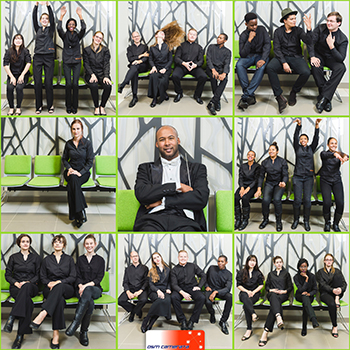Latest News Archive
Please select Category, Year, and then Month to display items
12 January 2024
|
Story Nonsindiswe Qwabe
|
Photo Sonia Small
 Since joining the UFS in 2008, Dr Grey Magaiza has worked extensively on approaches that can foster the socio-economic transformation of societies.
Since joining the UFS in 2008, Dr Grey Magaiza has worked extensively on approaches that can foster the socio-economic transformation of societies.
“The future should be one where communities can decide on their development agenda and futures. That’s the most important for me.” Dr Grey Magaiza, Deputy Director of the Centre for Gender and Africa Studies (CGAS) and Head of the Community Development programme on the Qwaqwa Campus, is passionate about capacitating communities to be agents of change and advancement. His vision for the future emphasises the empowerment of communities to take charge of their development by actively participating in decision making and the implementation of development projects that can improve their lives.
Since joining the UFS in 2008, Dr Magaiza has worked extensively on approaches that can foster the socio-economic transformation of societies. Over the years, he has crafted his research speciality into one that he is most proud of – being an interdisciplinary scientist immersed in the development of communities.
“I’m in a fortunate position of researching what I like. I say ‘fortunate’, because I’ve taken the time to understand what I’m passionate about, which is the overall field of rural livelihoods and livelihood futures – in short, community development. My research starts from an engaged university, understanding the elements that a university must use to enhance transformation and relevance to its immediate community in terms of development.”
One of the ways he has done this is by looking at social entrepreneurship as a development approach for young people in a rural setting. Through workshops with non-profit and civic organisations in Qwaqwa, Dr Magaiza has been helping these organisations to map out their needs and actively meet them through the involvement and support of external role players.
“We understand that communities are part of the national development agenda, but even that national agenda respects community knowledge and intentions and allows communities to shape their identity. A critical enabler of this is community organising. You bring back the capacity in communities to have dialogues on issues affecting them as spaces for engagement, knowledge exchange, and for people to just talk about their way forward.”
By enabling communities to define their development agenda, they can address their specific needs, challenges, and aspirations, he said. “When I look at livelihood futures, it’s quite an exciting aspect of my work – it’s like looking into a fortune tellers’ globe, because you’re not deciding for communities what they should do, but the communities themselves take those decisions.”
OSM Camerata among final six in international online competition
2017-08-28

The Odeion School of Music Camerata at the University of
the Free State celebrated its fifth birthday in May 2017.
Photo: Supplied
One of six – and the only contender from outside the United States of America. This is the extent of the achievement by the Odeion School of Music Camerata (OSMC) – one of six finalists in the 2017 International Ictus Music Competition.
The OSMC at the University of the Free State reached the final round of the competition, of which the winners will be announced on 1 September 2017. The competition is an innovative new online competition for ensembles, orchestras, and band/wind ensembles (middle school, high school, youth ensemble, community ensemble, and college/conservatory/university) that compete through video submission.
Odeion concert recorded as entry
The OSMC celebrated its fifth birthday on 31 May 2017, hosting a concert as part of the first round of the competition in the Odeion on the Bloemfontein Campus. The concert, which also served as a fundraising opportunity, consisted of a carefully curated concert programme which was recorded and submitted to the Ictus panel.
The repertoire for the concert, supported by a Concerts SA grant from the Samro Music Foundation, was commissioned from South African composers. Maestri Xavier Cloete and Gerhard de Jager served as conductors.
Substantial money prizes can be won, and ensembles will receive written feedback from a jury consisting of renowned maestri including Stilian Kirov, who was awarded 1st Prize in the Debut Berlin Competition on 18 May 2017. Top prize-winners will be interviewed and interviews will be broadcasted internationally.
Five years of many highlights
The OSMC was strategically founded in 2012 by Marius Coetzee as the OSM’s flagship chamber ensemble, with the main objective of creating a catalyst for excellence.
Over the past five years, the OSMC has premiered 15 new works by South African composers specially commissioned for them. A highlight remains its participation in the 13th International Conservatory Festival in St Petersburg Russia, where the ensemble received a standing ovation during a gala concert in the Glazunov Concert Hall.